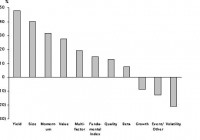You Could Short China At This Point, But It’s Not For The Fainthearted
Chinese stock markets could be set to fall by 50 percent. Given concerns of a stock market bubble in China, I take a bearish view on Chinese equities at this point in time. The ProShares Short FTSE China 50 ETF could potentially provide an opportunity to take advantage of a downturn. However, this strategy carries high risk given the degree of volatility inherent in Chinese stock markets. Once a booming economy at which a growth rate of below 8 percent annually was unheard of, things have certainly been changing for China in the past five years. Stock markets in China have certainly seen periods of abnormally high returns. However, such returns have come with significant volatility and sustained growth has remained elusive. For instance, the Shanghai Composite Index (000001.SS) has seen significantly high returns in the past year, up over 100 percent from the beginning of 2014 to May of this year. However, the trend now appears to be reversing, with the index having lost as much as 12 percent since the beginning of June, along with various experts predicting that the index could in fact fall by 50 percent. While I had previously commended China’s rise in stock prices and was optimistic on its continuation, I am less so in light of the recent volatility. Firstly, high stock market returns have not been matched by correspondingly high growth. China’s stock markets appear to have been taking a similar course as that of Europe, where quantitative easing and lower interest rates have forced investors to seek higher returns in the stock market. Moreover, this situation is being exacerbated in China given that returns from the property sector have been significantly lower than in previous years. In this context, I take a bearish view on China at this point in time. Given the historical nature of volatility across Chinese stock markets, the market appears to be at a significant risk of correction. This is especially possible given that stock returns are increasingly being driven by margin; i.e. investors are now borrowing to fund their positions. Should contagion develop in China and investors pull out their funds, then it is quite conceivable that a 50 percent drop would be possible under such circumstances. While a 50 percent drop seems rather drastic, it would not be that unusual when taking into account that the Shanghai Composite has already appreciated by over 100 percent in the past year. Moreover, China’s stock markets have precedent for demonstrating that they are not immune to contagion, with the Shanghai Composite having dropped almost 60 percent between 2007-08 in spite of higher economic growth rates above 8 percent at the time. Additionally, with China trading at a cyclically-adjusted price-earnings ratio of 20.5, this is significantly higher than the overall emerging markets ratio of 16.5. In this regard, China’s stock markets are likely overvalued and could be due for a pullback. While China’s quantitative easing has spurred increased investment in the stock market due to lower borrowing costs, this is unsustainable and there is always a risk of a sharp pullback in response to a rise in US interest rates, as investors seek more stable returns elsewhere. For investors wishing to take advantage of a specific short position on Chinese stock markets, one way of doing so is through the ProShares Short FTSE China 50 (NYSEARCA: YXI ), which has returned over 7 percent since the beginning of May. This ETF corresponds to the inverse of the FTSE/Xinhua China 50 Index and has succeeded in capturing a broad downturn in the Chinese market over the past two months. However, a significant risk remains in that investors would likely have to time the trade very well; returns on the ETF as a whole have been negative. Moreover, 5 of the 10 largest companies on the index originate from the financial sector. In this regard, it is likely that stock performance would move down in response to a broader economic downturn in China. However, with Chinese banks gaining traction internationally, it could be the case that this in fact lifts stock market performance higher. To conclude, I take an overall bearish view on the Chinese stock market at this point and a short opportunity likely exists. However, investors would likely endure significant volatility in doing so which would make this quite a risky trade. Disclaimer: Investing in emerging markets carries a high degree of volatility and as such, the above strategy is not recommended for conservative investors. Disclosure: I/we have no positions in any stocks mentioned, and no plans to initiate any positions within the next 72 hours. (More…) I wrote this article myself, and it expresses my own opinions. I am not receiving compensation for it (other than from Seeking Alpha). I have no business relationship with any company whose stock is mentioned in this article.
